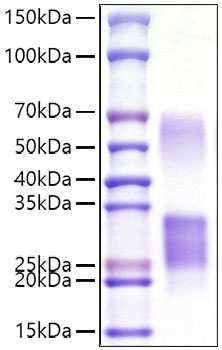RP01508
Scientist.com Supplier
Recombinant Mouse CD69 Protein
ABclonal
Image

DESCRIPTION
Early activation antigen CD69, also known as activation inducer molecule (AIM), is a single-pass type II membrane protein. Recently, cDNA clones encoding human and mouse CD69 were isolated and showed CD69 to be a member of the C-type lectin superfamily. It is one of the earliest cell surface antigens expressed by T cells following activation. Once expressed, CD69 acts as a costimulatory molecule for T cell activation and proliferation. In addition to mature T cells, CD69 is inducibly expressed by immature thymocytes, B cells, natural killer (NK) cells, monocytes, neutrophils and eosinophils, and is constitutively expressed by mature thymocytes and platelets. CD69 is involved in lymphocyte proliferation and functions as a signal transmitting receptor in lymphocytes, natural killer (NK) cells, and platelets. The structure, chromosomal localization, expression and function of CD69 suggest that it is likely a pleiotropic immune regulator , potentially important in the activation and differentiation of a wide variety of hematopoietic cells. This membrane molecule transiently expresses on activated lymphocytes, and its selective expression in inflammatory infiltrates suggests that it plays a role in the pathogenesis of inflammatory diseases. CD69 plays a crucial role in the pathogenesis of allergen-induced eosinophilic airway inflammation and hyperresponsiveness and that CD69 could be a possible therapeutic target for asthmatic patients.
DETAILS
- Tag: C-His
- Source: HEK293 cells
- Gene Id: 12515
- Species: Mouse
- Lead Time: 3 to 5 weekdays
- Swiss Prot: P37217
- Research Areas: Other Recombinant Protein
- Alternative Names: AIM Protein,Human,BL-AC/P26 Protein,Human,CLEC2C Protein,Human,EA1 Protein,Human,GP32/28 Protein,Human,MLR-3 Protein,Human,CD69
Equivalent Items
| ... Loading